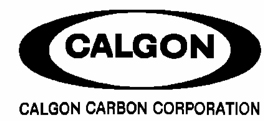Exhibit 99.1
| | | | |
 | | P.O. Box 717 | | Pittsburgh, PA 15230-0717 (412) 787-6700 |
— News Release –
CALGON CARBON ANNOUNCES UV PATENT DEVELOPMENTS
PITTSBURGH, PA – June 17, 2005 – Calgon Carbon Corporation (NYSE: CCC) has been advised by the European Patent Office (EPO) that it is granting the company a European patent on its process that employs ultraviolet light (UV) to prevent infection fromCryptosporidium found in drinking water. The European patent is being validated in 19 countries in Europe that are members of the EPO. Calgon Carbon had previously been granted patents on the process in Canada, China, Hong Kong, Israel, the Netherlands, New Zealand, and the United States, and applications are currently pending and awaiting issuance in other countries around the world.
The company also announced another development related to its Canadian patent for the use of UV light to prevent infection fromCryptosporidium.In a surprising pre-trial ruling, a federal court in Canada declared Calgon Carbon’s patent to be invalid, characterizing it as a discovery rather than an invention. The company intends to file an appeal, which could be heard later this year.
In Markman hearings in the New Jersey and New York district courts, the Courts agreed with Calgon Carbon’s position that its patents broadly cover methods of preventing infection fromCryptosporidiumfound in drinking water through the use of low dose UV.
Later this year, the U.S. Environmental Protection Agency is expected to promulgate final regulations for the prevention of infection fromCryptosporidium which will include ultraviolet light as a primary treatment methodology. Until Calgon Carbon’s invention of a process for employing UV light to inactivateCryptosporidium, the scientific community had rejected UV as a feasible option for treatment of the parasite.
Cryptosporidium is a major health concern worldwide because it is prevalent in drinking water whose source is surface water. When ingested, it can cause cryptosporidiosis, a diarrheal disease which can be fatal in individuals with suppressed immune systems.
Commenting on the announcements, John Stanik, president and chief executive officer of Calgon Carbon, said, “We are very pleased that the European Patent Organization has recognized the validity of our invention by announcing its intention to grant a patent for our process. We are, of course, disappointed with the Canadian ruling. Since it is based solely on Canadian law, the ruling will have no impact in the U.S where we are engaged in litigation to enforce our patent.”
Calgon Carbon Corporation, headquartered in Pittsburgh, Pennsylvania, is a global leader in services and solutions for making air and water cleaner and safer. The company employs approximately 1,100 people at 16 operating facilities and 27 sales and service centers worldwide.
The Private Securities Litigation Reform Act of 1995 provides a “safe harbor” for forward-looking statements. This document contains certain statements that are forward-looking relative to the company’s future strategy and performance. They involve known and unknown risks and uncertainties that may cause the company’s actual results in future periods to be materially different from any future performance.
###
For more information, contact Gail Gerono at 412 787-6795.
